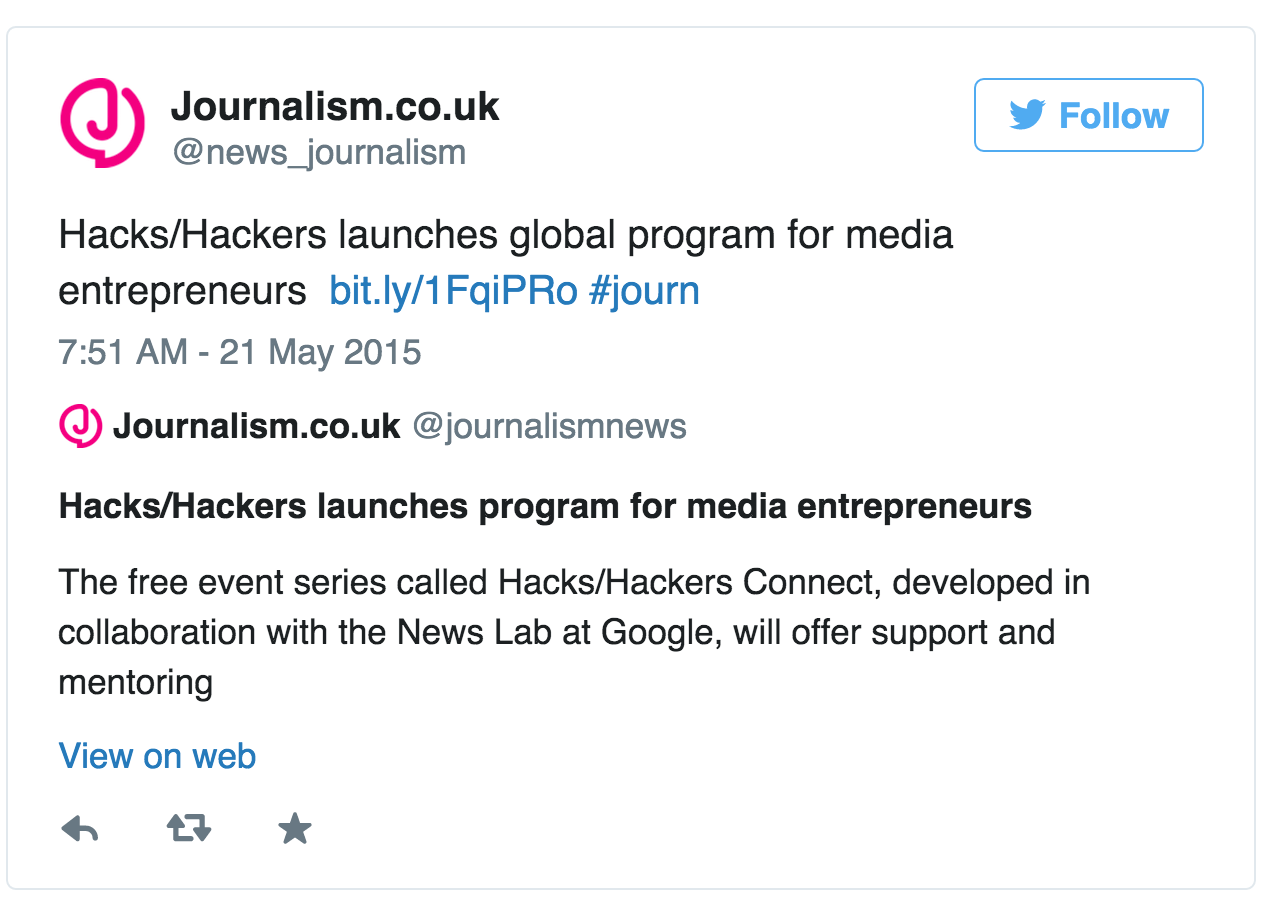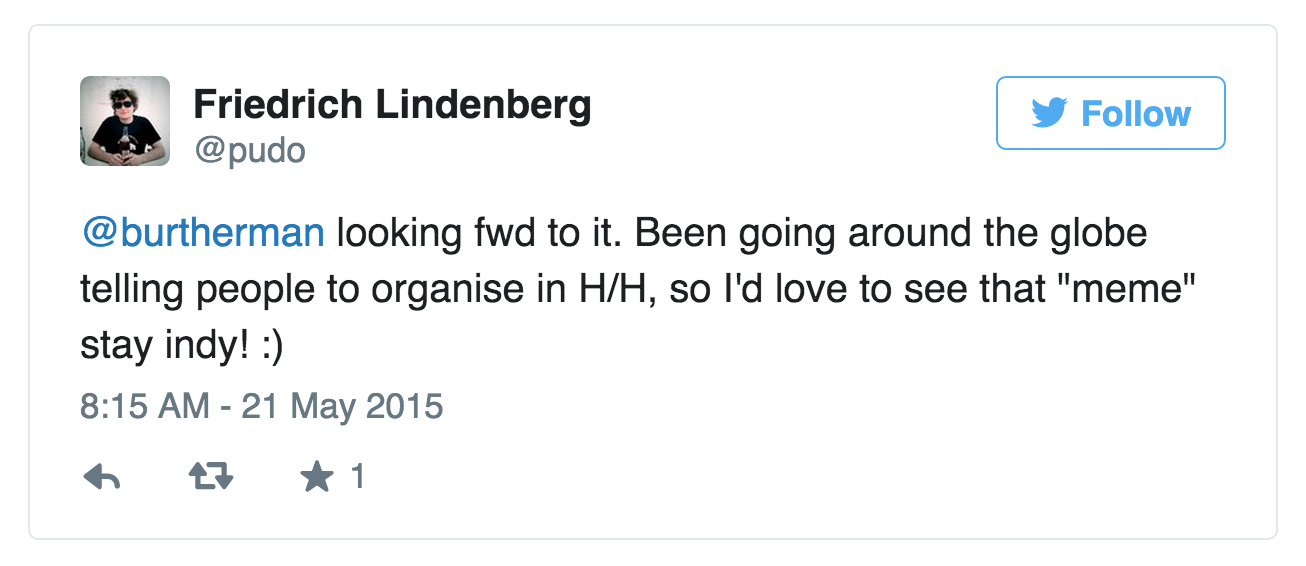Consulting, convening, coding, covering new ground, plus occasional commentary.
convening
What is Hacks/Hackers?
A network, a meme, an open source project?
(Scroll down to continue reading)
Five years ago, Hacks/Hackers was born. It started its life as a meet-up in San Francisco. Today it’s a global movement that brings together tens of thousands of tech-interested-reporters and journalism-curious-techies. The recent partnership with Google News Lab creates some big opportunities, and also bubbles up some important questions. Let’s explore.
Two months ago I jumped into a quickly evolving initiative that is now known as Hacks/Hackers Connect. Connect is a global event series aimed at making the Hacks/Hackers movement more awesome, more connected, and agitating for more startups in the news-media ecosystem.
Two weeks ago we announced Hacks/Hackers Connect publicly.
I’m not going to lie: it was a scramble. We embraced the ethos of “done is better than perfect.” We got the announcement out early and quickly. We put up a temporary landing page to gauge interest. We ate the Lean Startup dog food, shipped the MVP, and then watched the experiment run.
The launch was very much not perfect, but we believed that news of the partnership between Hacks/Hackers and Google News Lab was important information to share publicly.
The response was pretty amazing:

But there was also some confusion:

The confusion is not entirely surprising when you think about it: this global phenomenon comprises more than 30,000 “members” from 80+ chapters across several continents.
Given the sheer size and growth in just a handful of years, how could there possibly be just one idea of what Hacks/Hackers is?
So, given the above, what other concepts does Hacks/Hackers map on to? Is it a network, a meme, or is it closer to an open-source project? And can we use one of these to guide what comes next…?
Let’s think out loud here:
A network
Over the last five years as an organizer of — and fire starter for — Hacks/Hackers in Canada, I had always considered Hacks/Hackers to be a network, or a loose association. But something roughly like a trade association.
There are chapters. There are people who organize those chapters. We’re united by the focus of our exploration — journalism-meets-technology — and the make-up of the members — reporters and developers — but the individual groups are largely autonomous with some infrastructure provided by Hacks/Hackers HQ.
Chapters, in a sense, become “official” when they’ve been set-up with a Meetup.com group to organize their activities. Individuals need to “apply” to start an official chapter. However informal this process — e-mailing Burt, Chrys, Jennifer, Rich, or Aron — there is still a process.
For me, that process implied that there was a “centre” of kinds to this network — perhaps it’s a hub-and-spoke network, or a chapter-based association. But the network wasn’t entirely without a shape, or some kind of understandable form.
A meme
A meme on the other hand, in my experience, is typically something without much form — it’s a contagious idea, or a mind-bomb. It can take, or not take. It is often considered “viral,” expanding without much ability to control it.
I’m reaching back a bit now — trying to remember a gathering of people that I would clearly identify as a “meme” vs. a network — and one of the few event-meets-meme that comes to mind is BarCamp.
One did not need to apply per-se to run a BarCamp. One just started down the path of organizing an event and adding it to the BarCamp wiki.
Ideally one would follow the BarCamp format — roughly Open Space Technology — but there was also the option to “fork” it to your own liking, e.g., CopyCamp, DrupalCamp, WineCamp, and so on.
It was little more than a container to pour your own creativity into, and a refresh on an existing idea for running bottom-up style “un-conferences.”
I don’t personally see Hacks/Hackers that way.
An open source project
However, over the last few weeks, I’ve started to wonder if Hacks/Hackers is more like an open source project…?
There are some of the typical open source project patterns, for example:
- A Benevolent Dictator For Life: in this case, Burt Herman.
- Project “lieutenants:” the Hacks/Hacker Board of Directors, Chrys, Jenny, Rich, and Aron
- Localization leaders: people like Mariano Blejman in Latin America, Justin Arenstein in Africa, Joanna Geary in London, and many others.
And hundreds very active contributors around the world who organize chapters and run events — forking the project, improving it, and contributing back.
There’s a kernel. There’s an identity. There’s an idea.
All the things
So what do we call a this thing? And what does that imply for it’s shape, form, and — perhaps more importantly — it’s future growth, governance, and direction?
As it grows, what — if any — changes are needed to keep the “kernel” intact, while enabling individuals to continue to fork, adapt, and contribute back? How can individuals be encouraged to carry the Hacks/Hackers flag, while at the same time opening up opportunities for the movement to grow, accelerate, and increase its capacity, like this partnership with Google News Lab?
These are some big and hairy questions.
The Connect events are one opportunity to start having these conversations at a global level. First and foremost, the events will endeavour to create deeper connections in each city and across regions. More broadly, the events are intended to expand the Hacks/Hackers network beyond the choir and to bring in some new ideas. And, most importantly, we are looking for input on where to take the conversation next.
But mostly this conversation is in your hands: beyond the Connect events, what are the other opportunities to answer these big, hairy questions? What is Hacks/Hackers to you? A network? A meme? Or something else entirely? What are your hopes, aspirations, and concerns?
About
Hi, I'm Phillip Smith, a veteran digital publishing consultant, online advocacy specialist, and strategic convener. If you enjoyed reading this, find me on Twitter and I'll keep you updated.

Related
Want to launch a local news business? Apply now for the journalism entrepreneurship boot camp
I’m excited to announce that applications are now open again for the journalism entrepreneurship boot camp. And I’m even more excited to ...… Continue reading
Previously
The Perfect Home
From the future
Blow it all up: How can we make events suck less?